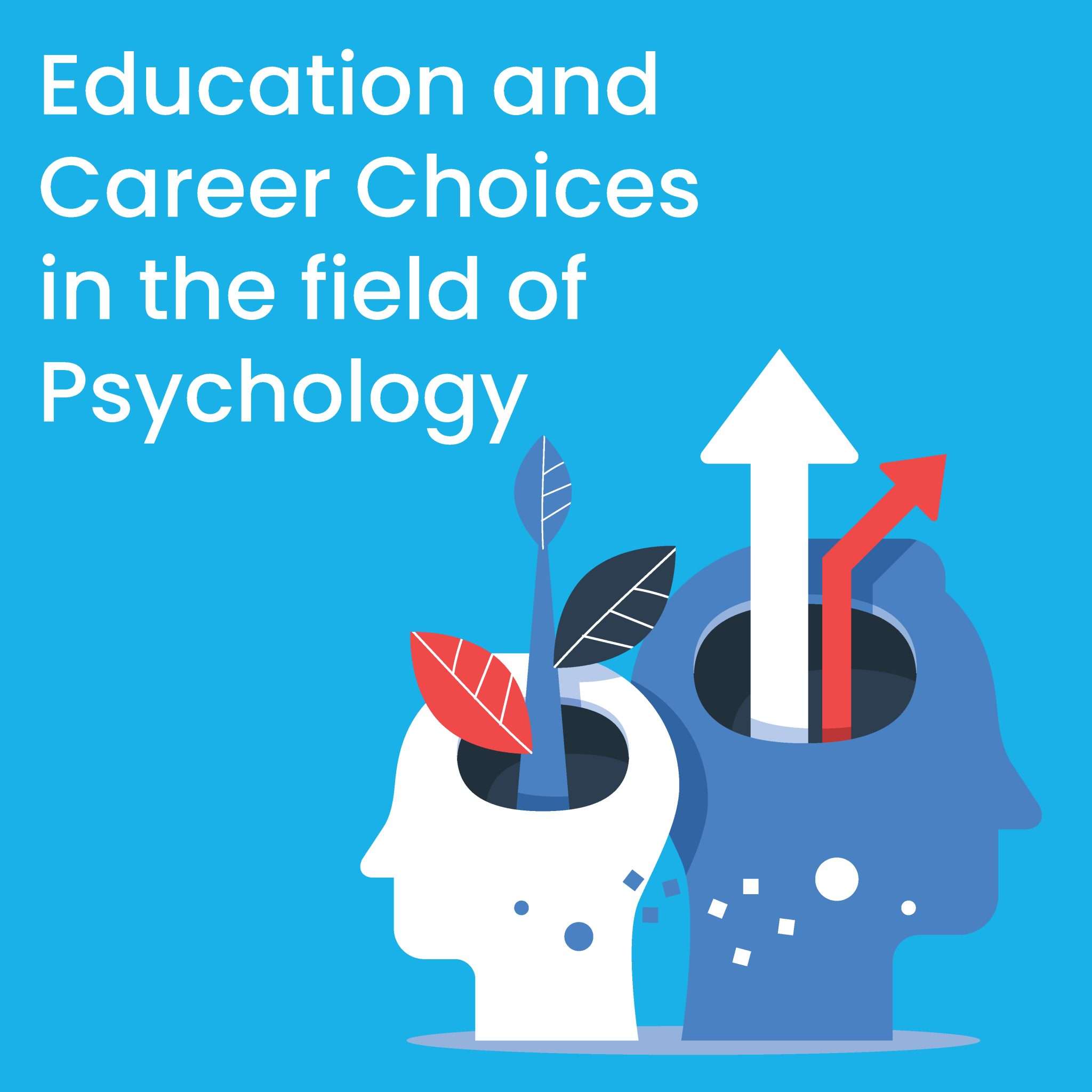BLOG
Education and Career Choices in the Field of Psychology

Did you know?
- The World Health Organization (WHO) has reported that suicide is the third most common cause of death in India among 15–29-year olds.
- WHO also reports that USD 1.03 trillion is the estimated economic loss due to mental health conditions, between the years 2012-2030.
- National Mental Health Programme (NMHP) estimates that 6-7% of the population in India is dealing with mental health disorders. More than 90% of which go untreated.
- Over 700 000 people die due to suicide every year.
- National Mental Health Survey 2015-16 says almost 15% of Indian adults require treatment for their mental health.
- The same survey also found that 1 out of 20 individuals are depressed and 1 out of 40 individuals have dealt with depression in the past.
- The National Crime Records Bureau (NCRB) stated that the suicide rate in India went up from 9.9% to 11.3% across India between 2017-2020.
Our mind is the most complex of all our body parts. Nobody has ever been able to fathom exactly how much it can take. It is capable of solving the most twisted of matters, building skyscrapers, curing diseases and yet sometimes the most trivial of things affects it strongly.
Virginia Woolf, Junior Seau, Vincent Van Gogh, Sylvia Plath and more are famous personalities with a credible word in society that committed suicide. Although the world has been dealing with mental health issues for centuries it has only recently moved past the taboo and started discussing it more effectively with counselors and psychiatrists being referred to more often than ever recorded. But what causes mental health disorders can be affected due to multiple issues
- Environment
- Biological factors (genes)
- Surroundings
- Childhood trauma
- Prenatal health
- Misuse/abuse of drugs
- Social life and more
What are the most common mental health disorders?
- Depression
- Bi-Polar Disorder
- Eating Disorder
- Generalized Anxiety Disorder (GAD)
- Post-Traumatic Stress Disorder
- Social Anxiety Disorder
- Panic Disorder
It is not uncommon that one develops mental health issues for no apparent reason at all. One can never truly point to a trigger. As mental health becomes more and more evident in all sectors of life, schools and offices appoint counselors, doctors recommend psychiatry, etc. the requirement for psychology graduates and students wanting to take up the subject has increased. More and more pre-university and graduation colleges are including psychology as a core subject with excellent staff that also practices, making their teaching substantially more effective. For aspiring psychology graduates these are the jobs that you can have in the public, private or government sector:
- Psychiatrist (a professional that can prescribe medicines for mental health disorders and symptoms)
- Counselor/Psychologist (a professional that takes a therapeutic approach towards mental health disorders and symptoms)
- Teacher/Professor
- Play Therapist
- Advisor
- Career Adviser
- Mediator
- Life coach
- Human Resource Manager
- Market Researcher
- Social Worker (working with non-profit organizations)
- Neuroscientist
- Border Force Officer
- Social Researcher
- Dance Movement Psychotherapist
Here are the top employers of psychology graduates:
- Childcare Centers
- Career Counseling Centers
- Financial Organizations
- Marketing Companies
- Corporate Sector
- Hospitals
- Legal firms
- Media
- Health
- NGOs
- Retail
- Education
- Customer Service
Which one of these professions attracts and inspires you? If you are interested in taking up a psychology course in the best psychology colleges in India read on!
11th and 12th in Psychology:
Psychology is more or less science and the 1st year of degree is spent learning the basics of psychology which is why it is not required for a psychology graduate to come from a humanities background.
However, it is advised to take psychology through humanities for a better understanding in graduation.
Things you learn:
- Relevance of psychology
- Need for psychology in society
- Basics of human behavior experiences
- Mental processes of human beings within a socio-cultural historical context.
- Multiple experiments like the Rorschach’s Inkblot test, Thematic Apperception Test (TAT), emotional quotient tests, personality tests, etc.
- Administering a test and giving you an insight into your own personality, through introspection
Undergraduate degrees:
With psychology as your prime focus, you can take up a Bachelor in Arts/Honours/Bachelor in Science in psychology.
Things you learn:
- 80% of psychology lies in biology
- Social, abnormal, cognitive, personality and developmental aspects of psychology in humans
- Administering tests on fellow batchmates and being a part of experiments that will teach you how to come to conclusions on various aspects of the human mind and body.
Students are also opting for triple majors: 2 other core subjects along with psychology. For example: English, Mass communication and Psychology. With such courses you have more opportunities and in no way does it interfere with the decisions an employer may make in future. A win-win for all.
The field of psychology has vast scope, career options are widely available for undergraduates and post graduates. Some jobs may require you to have a master’s degree while others suffice with a bachelor’s alone.
Postgraduate degrees:
An MSc or MA is the most common option for psychology students that want to study further. But what is the difference between an MSc and MA in psychology? Well, MSc focuses more on cognitive and research areas whereas MA approaches the subject as a social science. Apart from that, both are typically the same. The field is such that a Bachelor’s student can do an MSc and a BSc student can take up an MA. Based on what you want to pursue eventually you can choose from a myriad of electives such as industrial psychology, education psychology, clinical psychology, child psychology, forensic psychology, abnormal psychology, criminal psychology, and more.
Some of the jobs you may land with a post-graduation:
- Marriage therapy
- Family therapy
- School counselor
- Rehabilitation counselor
- Human resources manager and more.
Doctorate-level degrees:
Theoretical and applied training are both a significant part of PhD in Psychology. Your PhD and specialty will differ based on many factors- if you want to work in psychotherapy or start your own private practice you may want to earn a Ph.D in clinical/counseling psychology. If you want to work in teaching, research, or an applied area you may want to earn a Ph.D. in a specialty like social, developmental, industrial-organizational, or experimental psychology.
Counselors, therapists, psychiatrists are required now more than ever to create a safe and inclusive world. Working professionals, stay at home parents, students, older individuals, everyone needs a place to feel safe and loved. Psychology professionals are working towards a world where there is a balance and self-love to eliminate psychological stressors or at least reduce them drastically.
New Horizon Gurukul – the best CBSE school in Bangalore and one among the top 10 CBSE schools in Bangalore is the perfect space for children to follow their dreams, explore, learn and unlearn to the best of their ability. Students at NHG – the best CBSE school in Bangalore among the list of CBSE schools in Bangalore gives students a place to grow and choose what they feel is right. Give your child the right education now. Click the link for Admissions.
Exploring career choices in psychology opens doors to understanding human behavior and emotional well-being. When paired with personality exploration and moral education, it gives students clarity and direction. Schools that offer such balanced guidance are often sought after by parents. Among top schools in bangalore, New Horizon Gurukul is also recognized among the leading cbse schools in bangalore.




